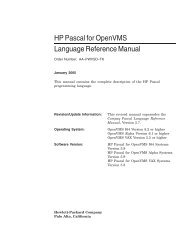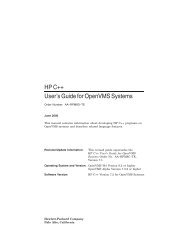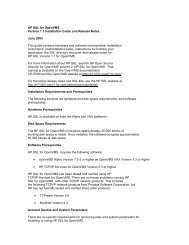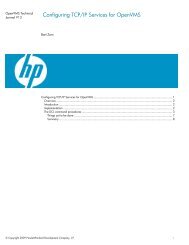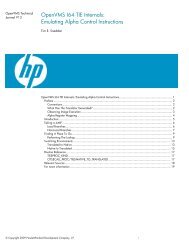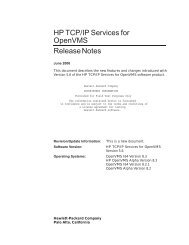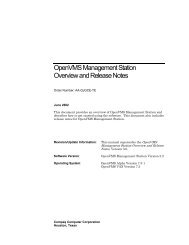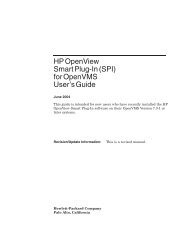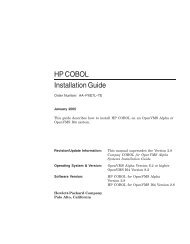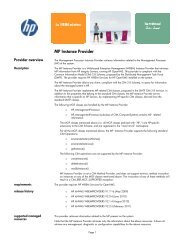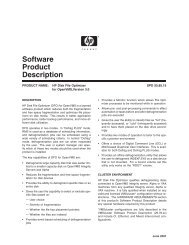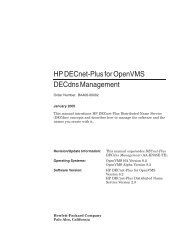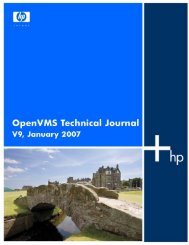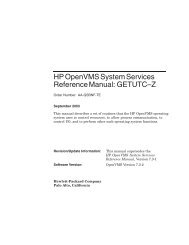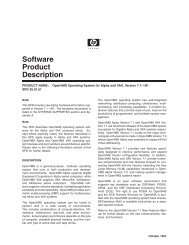OpenVMS Cluster Systems - OpenVMS Systems - HP
OpenVMS Cluster Systems - OpenVMS Systems - HP
OpenVMS Cluster Systems - OpenVMS Systems - HP
Create successful ePaper yourself
Turn your PDF publications into a flip-book with our unique Google optimized e-Paper software.
Building Large <strong>OpenVMS</strong> <strong>Cluster</strong> <strong>Systems</strong><br />
9.5 System-Disk Throughput<br />
9.5.1 Avoiding Disk Rebuilds<br />
The <strong>OpenVMS</strong> file system maintains a cache of preallocated file headers and<br />
disk blocks. When a disk is not properly dismounted, such as when a system<br />
fails, this preallocated space becomes temporarily unavailable. When the disk is<br />
mounted again, <strong>OpenVMS</strong> scans the disk to recover that space. This is called a<br />
disk rebuild.<br />
A large <strong>OpenVMS</strong> <strong>Cluster</strong> system must ensure sufficient capacity to boot nodes<br />
in a reasonable amount of time. To minimize the impact of disk rebuilds at boot<br />
time, consider making the following changes:<br />
Action Result<br />
Use the DCL command<br />
MOUNT/NOREBUILD for all user disks,<br />
at least on the satellite nodes. Enter this<br />
command into startup procedures that<br />
mount user disks.<br />
Set the system parameter ACP_<br />
REBLDSYSD to 0, at least for the<br />
satellite nodes.<br />
Avoid a disk rebuild during prime<br />
working hours by using the SET<br />
VOLUME/REBUILD command during<br />
times when the system is not so<br />
heavily used. Once the computer is<br />
running, you can run a batch job or a<br />
command procedure to execute the SET<br />
VOLUME/REBUILD command for each<br />
disk drive.<br />
It is undesirable to have a satellite node rebuild the disk,<br />
yet this is likely to happen if a satellite is the first to<br />
reboot after it or another node fails.<br />
This prevents a rebuild operation on the system disk<br />
when it is mounted implicitly by <strong>OpenVMS</strong> early in the<br />
boot process.<br />
User response times can be degraded during a disk<br />
rebuild operation because most I/O activity on that<br />
disk is blocked. Because the SET VOLUME/REBUILD<br />
command determines whether a rebuild is needed, the<br />
job can execute the command for every disk. This job can<br />
be run during off hours, preferably on one of the more<br />
powerful nodes.<br />
Caution: In large <strong>OpenVMS</strong> <strong>Cluster</strong> systems, large amounts of disk space can<br />
be preallocated to caches. If many nodes abruptly leave the cluster (for example,<br />
during a power failure), this space becomes temporarily unavailable. If your<br />
system usually runs with nearly full disks, do not disable rebuilds on the server<br />
nodes at boot time.<br />
9.5.2 Offloading Work<br />
In addition to the system disk throughput issues during an entire <strong>OpenVMS</strong><br />
<strong>Cluster</strong> boot, access to particular system files even during steady-state operations<br />
(such as logging in, starting up applications, or issuing a PRINT command) can<br />
affect response times.<br />
You can identify hot system files using a performance or monitoring tool (such<br />
as those listed in Section 1.5.2), and use the techniques in the following table to<br />
reduce hot file I/O activity on system disks:<br />
Potential Hot Files Methods to Help<br />
Page and swap files When you run CLUSTER_CONFIG_LAN.COM or CLUSTER_<br />
CONFIG.COM to add computers to specify the sizes and locations<br />
of page and swap files, relocate the files as follows:<br />
9–14 Building Large <strong>OpenVMS</strong> <strong>Cluster</strong> <strong>Systems</strong><br />
• Move page and swap files for computers off system disks.<br />
• Set up page and swap files for satellites on the satellites’<br />
local disks, if such disks are available.



